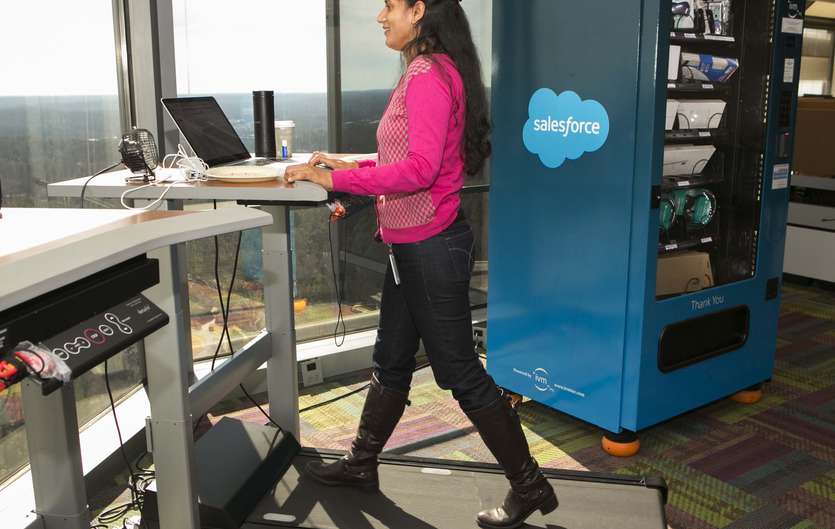
The yoga room is dim and serene as several Salesforce employees move from pose to pose during a lunchtime class.
Now zoom up more than 25 floors from the fitness center to the four top floors in Buckhead’s Atlanta Plaza, home to Salesforce’s local office. In a corner of one floor, a Salesforce employee walks at 2 mph pace (faster than the average) on a treadmill desk for her daily dose of exercise without sacrificing work time. The desks behind her and on other floors are adjustable to give employees the option to sit or stand. A masseuse offers free messages in a private room.
Or Salesforce’s workers can just play. A pool table, a ping-pong table and video game station are all areas for Salesforce’s growing Atlanta workforce to burn energy or hash out business ideas.
“We want to foster innovation in how we set everything up,” said Salesforce’s top local executive, Warren Wick, senior vice president, enterprise sales. “What we’re trying to do is bring out the best of our employees.”
The San Francisco-based company, founded in 1999, has grown to 20,000 global employees, including 592 in Atlanta as of early 2016. Salesforce shot up from No. 17 last year on the mid-sized employers list to the top of the large employers 2016 Top Workplaces list.
Employees often are on the move. Workers who come into the 85,000-square-foot Atlanta office can work from their own desk, at tables in the open kitchens, on couches and window seats, in rocking chairs, or in meeting rooms of various sizes with wipe-board walls. The staff also can work outside of the office, including at home or at customer locations.
“It’s a highly collaborative culture. You don’t go from where we were 17 years ago to where we are today if you can’t foster a foundation of trust that’s going to draw people’s best work out of them,” Wick said. “We have an open floor plan to try to make sure that employees do really connect with each other … they’re fired up to come here and work every day.”
A lively, hip workplace is expected for technology companies, and Salesforce doesn’t disappoint in its perks. The kitchens are stocked with free coffee and beverages, including milk, soy milk, LaCroix and orange juice, and snacks, such as Greek yogurt, hummus and pretzels, cereal and granola bars.
Salesforce operates in the fast-changing digital world, but the fast-growing global company is focused on having a consistent culture. From location to location, employees see the same Hawaiian-inspired motif and purple, green and orange palette in the office decor, eat the same types of snacks, and see the attention on volunteering.
The publicly traded enterprise software company uses its Salesforce Customer Success Platform and world’s No. 1 customer relationship management system to deliver an average of 4.1 billion transactions daily (according to third quarter 2015 data). More than 80 percent of its customers are Fortune 500 companies. In 2015, Salesforce reported revenue of $5.37 billion, a 32 percent increase from 2014.
The company’s “integrated philanthropy” model works like this: It donates 1 percent of its employee time, 1 percent of its equity and 1 percent of its product to help improve communities. The Salesforce “Ohana,” which is Hawaiian for family, is made up of employees, customers, partners and communities, according to the company.
“We view it as a family. The minute you join up, you’re a part of that,” Wick said. “The faster we can get people in and understanding who we are and what we stand for, again, it pulls through in terms of the work and the quality of the work that they do.”
Through the Salesforce.com Foundation, all Atlanta employees receive six paid days of volunteer time. After they max out those, they receive a $1,000 challenge grant to give to an organization(s) of their choice. In the past five years, Atlanta employees have logged over 5,000 volunteer hours.
Grace Helmer, an associate implementation specialist, uses her volunteer hours to take overnight shifts about twice a month at Grady Health’s 24-hour Rape Crisis Center.
“It really stuck out to me that this company was so invested in helping others that that would be a place I would want to go to. Even on your first day, you’re introduced to volunteering,” said Helmer, who assembled bags of necessities for the homeless through the United Way.
On each floor, a huge wall of photos with white frames show off new employees and volunteer efforts, and encourage Salesforce members to use hashtags such as #volunteerforce.
“People that join Salesforce self-select because, typically, they want to give back,” Wick said. “It’s sort of core ethos that’s important to them, and so it’s not something we do once a year, and it’s something that when people come and say I’ve got my VTO (volunteer time off) today, everyone is like, that’s great, and how can I get involved, and it creates a real flywheel of energy.”
The staff is challenged to think about innovation in the broadest context possible, such as on any number of platforms and for any industry, Wick said. Tunnel vision isn’t allowed.
“We’re obviously excited to grow as an organization, but we’re already thinking through what’s the next generation of that?” Wick said.
The Atlanta office, which continues to add new hires in 2016, has a 54 percent employee referral rate, according to the company. A friend recommended Kyle Coleman, a senior product manager who describes her co-workers as driven problem solvers who are motivated by customer success.
“To know I was learning from the experts in the biz and I am challenged every day and just pushed in a way that really took me down the career growth path I was looking for,” she said. “Here we have this built-in audience ready to use the solutions that you built for them and at the ready to be successful with your product globally.”
From: AJC.com
